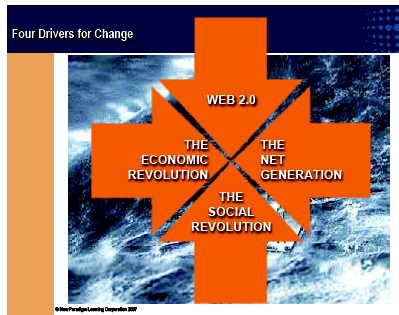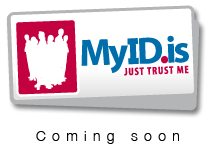Beaucoup de monde dans la salle, le sujet intéresse.
Il s’agit d’un panel composés de:
Sam Lawrence, Chief Marketing Officer, Jive Software
Lee Bryant, Director, Headshift
Laurent Gasser, Chief Executive Officer, Revevol
Interviewé par Brady Forrest d’Oreilly radar.
Those are my notes, not an exact transcript of what they said, but my interpretation, so there might be some misunderstandings.
LB:
social change is massive in the compagny
biggest transformation since email
not about techno but about usage
We have a set of existing entreprise product
It department is often backward and old school
how do we get around IT departement?
But he is working with top ten law firm
=> very visionnary people inside those compagny
very sustantial changes coming.
SL:
Clearspace is similar to sharepoint
Integration with core business application is key
They don’t look at the different tool separatly they use them thogether
something as a all.
LG:
Enterprise 2..0 consulting company
New Behaviors to create value
LB:
Web2.0 definition
Building an architecture of participation
network effect
Doing thing together we can’t do alone
Connect the reading and writing done in the enterprise create incredible value
SL:
There is a ton of things that happens to create a document, an information.
Finding the right person, asking, searching, filtering,…
Only a small fraction is done using tools, there is a huge hole.
Framing that problem and coming with a solution
LG:
Web2.0 is a set of different tools
There is not one tool more important than the others
Find the best usage inside the corporation and then chose the appropriate tools.
Key of success is to set up the right mix
In small corporation they do it harder in bigger corporation
People only use it if they find value
you have to start with the usage
SL:
It’s not good if tools are disconnect
LB:
Looking from the tools angle is the wrong angle
looks at the usage and then chose the tools
LG:
If you put a word document inside a wiki it doesn’t work
it’s not the usage of a wiki
SL:
IT is ofen painted as the bad people
They have to be empowered with tools to respond to the business needs
LB:
Often, the easiet thing is to take sharepoint because it is given for free.
But This tool might not be good for the usage
The key is how you prototype the system
Give the possiblities to syndicate in the enterprise informations found on tools in the public Internet.
LG:
Facebook inside clearspace, there going to be a blending
Opening of the firewall is an issue, but it will come anyway
SL:
Even in small compagnie people don’t know each other
=> social network is one solution
BF:
How to you generate the social graph?
ask them to connect to each other?
Watch what they do? (send it, blog, comment)
LB:
you need to give the people immediate payback about their actions
They do something and their profile is enriched
You create social filter
I want information from the people I work with and share interest
80’s crappy management is going to crash with the coming generation people
SL:
Hierachy are not going away
you can collaborate, take inputs but in the end someone has to decide and make clear why they made this choise instead of another
LG:
one keyword for web2.0 is agility
the need of new governance
every one is afraid
The problem is not at the top but for middle management.
The first compagnies to make the right transformation will be the winners on the market
Question from the audience
Knowledge is power, so…
LG:
main blocking point, depens on the culture the problem is quite strong in france
more true for middle management than top
A soution is to show the value of sharing
CEO should agree
Do a pilote, choose the right place to do it
show the result
and you will overcome the issue
LB:
network productivity always trumps individual productivity
Armies and the mafia are becoming networks
Knowledge is power, no
Network is power
The issue is in the middle management
SL:
In social network reputation is going to be important
Question:
All the tools are in sharepoint or IBM products, so IT says the tools are already there, use them, and nothing changes.
LB:
We need to help IT to change, most of them want to work with the cool stuff


 déjà avoir une petite idée du sujet auquel s’attaque Charles: l’Identité Numérique. Ce n’est pas forcément évident au premier abord mais on est en plein coeur de la problématique web2.0. D’ailleurs Il a beaucoup été question d’openID durant l’expo, myid.is est une implémentation d’openID.
déjà avoir une petite idée du sujet auquel s’attaque Charles: l’Identité Numérique. Ce n’est pas forcément évident au premier abord mais on est en plein coeur de la problématique web2.0. D’ailleurs Il a beaucoup été question d’openID durant l’expo, myid.is est une implémentation d’openID.